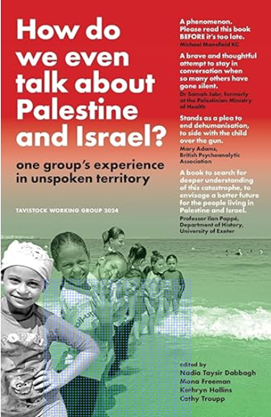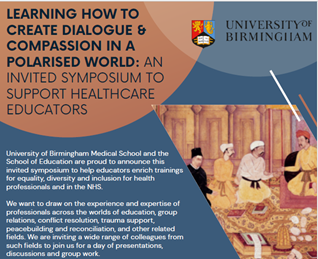Can listening to personal narratives help health professionals to maintain caring relationships during times of political tensions, whether local or global? This is a question that a colleague and I have been exploring in the health service in Britain over the past two years, during the war in Israel and Palestine.
I’m Jewish and a medical educator. I’ve been working with a Muslim medical educator, Professor Sabena Jameel, to develop forms of training for our colleagues that encourage them to bear witness to each other’s personal narratives of anguish, even if they come from different backgrounds and have opposing views – and to be able to hear these without feeling the need to counter these with polemical responses. We believe this is necessary both for good working relations and for patient care.
Sabena and I started out by writing an editorial for the medical journal The Lancet.1 We gave it the title “A call for education against hatred.” In it, we expressed concern about the escalating amount of hatred we were hearing around us after the brutal events in Israel on October 7, 2023, and in Gaza since then. We wrote about our personal experiences of teaching in both Israel and Palestine. We described how colleagues, students, and ordinary people we met on both sides were remarkably similar, as well as sharing much with ourselves. We expressed our alarm at how the war in Israel and Gaza was provoking an escalation of expressions of Islamophobia and antisemitism not only between our communities but more widely.
We wrote: “We are concerned at how it sometimes appears as if every Palestinian and Muslim person must be held to account for the violence of Oct 7, 2023, while every Israeli and Jewish person is at fault for the destruction in Gaza. Holding on to notions of complexity—the idea that individuals on both sides are caught up in a maelstrom where there may be a wide range of different, contradictory, and negotiable attitudes—seems to have become almost impossible.” We argued that medical educators should create spaces for health professionals of all backgrounds to speak of their personal and family experiences of war, displacement, persecution, and trauma, so colleagues could understand how hatred arises, how it is experienced and how it affects perceptions of the world. We proposed that educators should help learners to acquire cultural humility, through efforts to hear and respect what leads others to take different view of the world, even if one’s initial reactions are of anger or pain.
We followed up our article by running a live workshop at the annual conference of the Association for the Study of Medical Education at the University of Warwick. During it, we each spoke of our personal backgrounds in front of an audience of colleagues. I explained my own story as the son of Jewish refugees in the late 1930s, whose family members had nearly all been murdered by the Nazis. Sabena described how her family had come from India, as many immigrants did from former British colonies, in order to seek work and advancement in the UK. She talked of the obstacles they had to overcome to settle and succeed here. We each spoke about the distress we experienced in hearing prejudiced opinions within our own faith communities – each fearing the other or avoiding contact with them – and how this affected us.
For most of the people witnessing our conversation, this was the first time they had heard a Jewish and Muslim colleague talking openly and sympathetically with each other about current events and the personal impact of these. We also gave participants an opportunity to speak with each other about their experiences of working across the boundaries of faith, nationality and other identities, and to share ideas about how to promote dialogue and mutual respect, even when people are experiencing distress on account of political or other forms of conflict. Following this workshop, we facilitated several events with medical educators along similar lines, helping them to think about difficult scenarios they were facing, for example with hostility and suspicion between Jewish and Muslim or Palestinian medical students.
We subsequently learned of another, similar initiative: a discussion group of current and former staff at the Tavistock Clinic, the leading training institute in London for psychological therapies. The group was meeting monthly. Its members were of Jewish, Muslim, Christian and other backgrounds. They used their meetings to tell their personal stories, to exchange views about events in the Middle East, to hear different perspectives on the history, politics of the region, and to express their fears for the future. The group also decided to publish a book describing their interactions and reflections, with the title “How do we even begin to talk about Palestine and Israel?” It was a courageous project, where they each described their struggles to acknowledge the narratives of others whose personal, family and religious backgrounds were so different from their own.

Although I wasn’t a member of the discussion group, they invited me as a former member of staff at the Tavistock to write the final chapter of the book. In it, I described my upbringing in a Jewish family where loyalty to Israel was taken for granted, and then the growing disaffection I felt over the years as the political situation in the region deteriorated, and particularly after teaching doctors in Palestine. I wrote of the importance of dialogue with others with highly divergent views, while holding on to moral clarity both about the atrocities carried out by Hamas and the genocide being committed in Gaza.2
The convergence of our two projects led to a decision to launch a one-day national symposium to influence health professionals across the UK to try out imaginative ways of addressing unspoken and unresolved conflicts between health professionals that could threaten to impair working relationships and patient care. We raised a grant from an educational charity to do this. The symposium took place at Birmingham University in September. We called it: “Learning how to create dialogue and compassion in a polarised world.” We invited senior healthcare educators, including the leaders of trainings in equality, diversity and inclusion from several medical schools. We all spent the day listening to presentations – including the project led by Sabena and myself and the one run by the Tavistock group – and taking part in intensive small group discussions to explore new approaches to training that would allow participants to “break the silence” around difficult or contentious issues relating to personal identity. We covered not only geographical conflicts, but ones related to gender identity and other “triggers” for strong and emotional disagreements. We used the day to model ways of conducting group dialogue in ways that were psychologically safe and promoted more conscious awareness of the position of colleagues and patients with views that might be difficult to hear. We now aim to write an advisory report based on the event, which we hope educational organisations around the UK can use as a guide.

We’ve have found all this work both challenging and moving, as well as emotionally exhausting at times. We also believe passionately that we cannot avoid this work. There is no more important place than our health services to resist and overcome the rising tide of hatred in the UK, Europe and worldwide. As health professionals, we must do all we can to preserve and sustain the values of listening and tolerance.
Bibliography:
- Jameel S, Launer J. A call for education against hatred. Lancet 2024; 403: 2684-2685
- Dabbagh NT, Freeman M, Hollins K, Troupp C. How do we even begin to talk about Palestine and Israel? London: TWG books, 2025.
